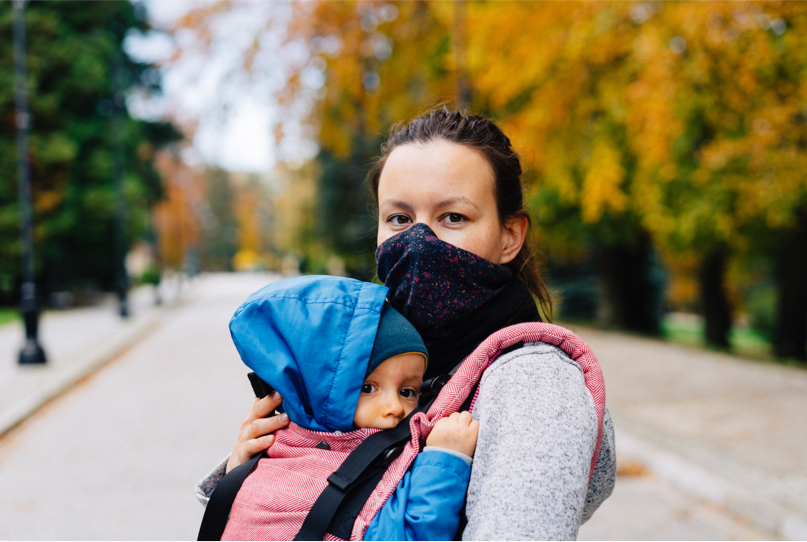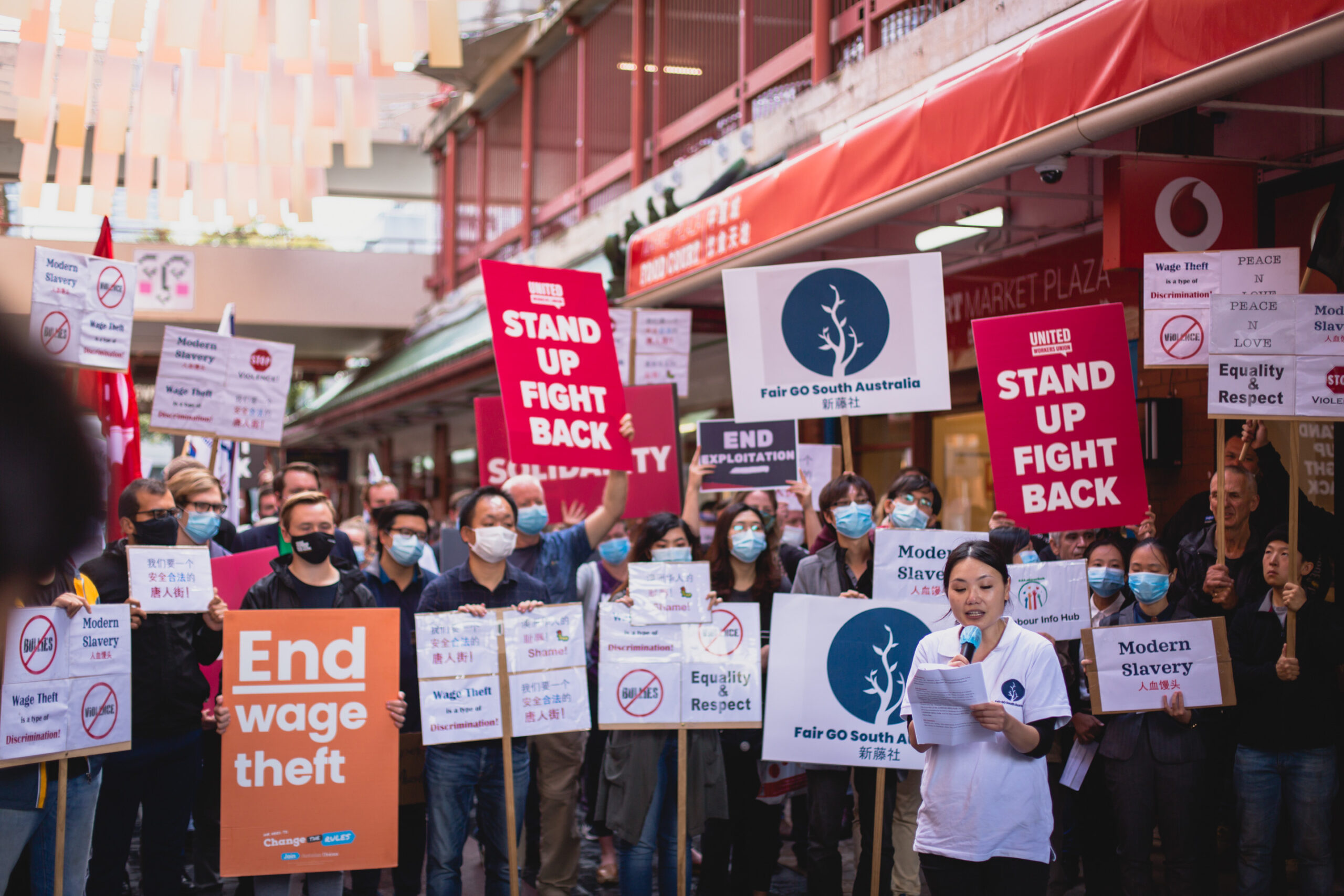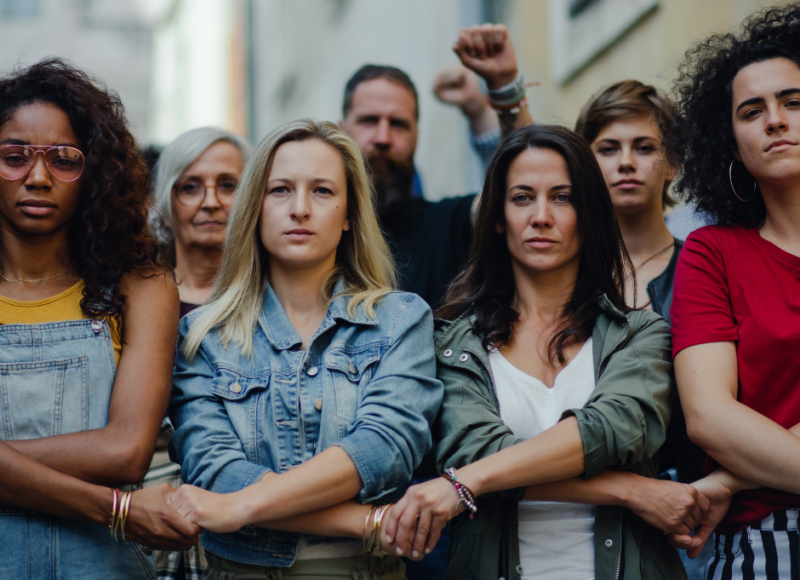Your cart is empty.


Your cart is empty.
Workplaces should be safe places for all – free of sexual harassment, discrimination and bullying and violence. Employers must stop silencing workers who have experienced sexual harassment. Non-Disclosure Agreements in sexual harassment matters should be restricted and regulated.

Sexual harassment occurs in every industry, at every level and in every location. To tackle workplace sexual harassment, we must challenge outdated gender stereotypes and unfair power imbalances in the workplace.
We are campaigning for changes to restrict and regulate the use of Non-Disclosure Agreements (NDAs) in workplace sexual harassment cases. By ensuring victim-survivors have the choice to be able to tell their story, we can create stronger accountability and positive change in workplaces.
Non-Disclosure Agreements (NDAs) are legal contracts which require someone to keep secret the details of the harassment they experienced, often for the rest of their life. In sexual harassment matters, victims often feel like they have no choice but to sign an NDA to resolve their complaint.
It is difficult to stop sexual harassment if the people who experience it are prevented from talking about it. Employers and their lawyers are routinely silencing and further harming victim-survivors by compelling them to sign NDAs. NDAs hide systemic problems in workplaces and discourage positive action for change by protecting those responsible. Many experts now agree that blanket NDAs in sexual harassment and discrimination settlements are harmful and counterproductive.
It is not uncommon to read news stories about celebrity perpetrators who have used NDAs to cover up their abuse. However, it is less well known that NDAs are regularly used by powerful employers in Australia against ordinary workers.
75% of legal professionals have never reached a sexual harassment settlement without strict NDA terms.
59% of people who experienced sexual harassment in the workplace said their harasser had also targeted others. Sexual harassment is a collective issue, but NDAs stop workers from being able to take action together.
The overuse and misuse of NDAs prevent workers, the public and governments from knowing important information about employers, workplaces and the high occurrence of sexual harassment.
The Project / 29 July 2024
This TV segment explores the impacts of Non-Disclosure Agreements.
Viewing time 6:24mins.
Watch
Positive Duty
Employers now have a legal responsibility – called Positive Duty – to proactively ensure their workplaces are safe places to work, free from sexual harassment, discrimination and unlawful conduct. The blanket use of NDAs in sexual harassment matters could prevent workplaces from meeting their Positive Duty obligations.
Alongside other recent beneficial changes to laws to combat sexual harassment in Australian workplaces, NDAs need to be regulated and restricted. We have the opportunity to do this in South Australia.
The Working Women’s Centre SA is calling on the South Australian Government to legislate to restrict and regulate the application of NDAs in our state, so that their overuse and misuse is stopped.
Changing the laws would build on existing Australian Government and South Australian Government commitments to Respect@Work and ensuring safer workplaces.
Join the call to stop silencing women and workers through NDAs. Help eradicate sexual harassment and discrimination in our workplaces. Sign up to be involved.
There are strong moves towards NDA law reform in Australia, and around the world.
In June 2025, the Australian Human Rights Commission published its report Speaking from Experience: What needs to change to address workplace sexual harassment. This landmark report includes 11 recommendations, including to amend the Sex Discrimination Act 1984 (Cth) to restrict the use of NDAs in Australia, in line with Ireland’s Employment Equality Act 1998.
The Victorian Government have committed to introduce legislation to restrict the use of NDAs in sexual harassment cases, in 2025. This follows the Victorian Ministerial Taskforce on Workplace Sexual Harassment recommending restrictions to the use of NDAs in workplace sexual harassment cases. The Victorian reform process has been championed by the Victorian Trades Hall.
Ireland’s new Maternity Protection, Employment Equality and Preservation of Certain Records Act 2024 amends the Employment Equality Act 1998 by restricting the use of non-disclosure agreements (NDAs) in situations involving allegations of discrimination, victimisation, harassment and sexual harassment. The Act essentially makes NDAs the exception to the rule. Any exempted NDA needs to meet strict requirements.
In the United Kingdom, the Starmer Labour Government announced in July 2025 it will introduce a new amendment to the Employment Rights Bill 2025 (ERB) which would ban the use of NDAs to silence victims of harassment and abuse at work. Other whistleblowing protections related to NDAs are also in progress.
In the United States, a federal law known as the Speak Out Act (SOA) was passed by the United States Congress in late 2022. It prevents the enforcement of pre-dispute NDAs in cases of sexual assault or harassment. Some eighteen U.S states have prohibited or regulated NDAs (as have provinces in Canada).
What would effective law reform look like?
for specified circumstances, always at the active instigation of the victim-survivor, without coercion, and with the opportunity for independent legal or industrial advice.
If you would like to read more, you can download our PDF resources:
Two-page basic info sheet about our campaign here
Two-page law reform summary here
Three-page selected media reports and public commentary here
Everyone should have equal access to opportunities in life. Instead, women are often overlooked for secure, well-paid jobs, and women’s work is undervalued and underfunded. Our vision is for a future in which women have equal access to economic resources.

There is stark inequality in Australia based on gender.
For every dollar men earn, women earn 78 cents. This means women earn about $28,425 less per year.* Women also have 25% less superannuation than men, on average.* Women spend 9 more hours every week on unpaid work than men, including domestic and care work.*
Wealth inequality is high in Australia, and women are more likely to live in poverty than men. In a recent survey about the cost of living crisis, 31% of women reported that their household finances were much worse, compared to 13% of men.* Women who are the main income earners for their household are almost twice as likely to experience poverty, compared to their male counterparts.* On the other end of the wealth spectrum, out of the 200 richest people in Australia, more than 80% are men.*
Gender inequality also intersects with many other power imbalances in our society, such as discrimination on the basis of race, disability or sexuality. For example, LGBTIQ+ people in Australia disproportionately experience poverty, homelessness and unemployment.*
*References in order: WGEA Gender Equality Scorecard 2023-24, An update on superannuation balances 2023, How Australians Use Their Time 2022, Doing it Tough 2024, Poverty in Australia 2023, AFR Rich List 2024, LGBTIQ+ Experiences of Poverty submission 2023
In 2020, we ran a project investigating the disproportionate impacts of COVID on young women. We found that:

Economic justice is connected to safety. Job security can be protective against violence.
Gendered violence is very common. About 1 in 3 Australian women have experienced violence perpetrated by a man since the age of 15.* 1 in 3 people in Australia have experienced sexual harassment at work in the last 5 years.*
Insecure work is work where there is a level of uncertainty about hours, income or whether the work will continue long-term. This can look like casual work or short-term contracts rather than permanent contracts. Job insecurity creates an unequal power dynamic that is linked to violence against women.
You can find more information about these links in our report.
*References: ABS Personal Safety Survey & the Fifth National Survey.
Our workshops help challenge outdated gender stereotypes and prevent sexual harassment.
BookWebinar
This webinar from 2020 discusses the impacts of COVID19 on young women, what needs to happen to stop us from being left behind, and how to turn our anger into action. Several powerful young women joined us to share their thoughts and experiences.
Watch
Donate
Your generous support enables us to keep supporting and advocating for vulnerable workers.
Donate todayHow does job security help to protect workers from sexual harassment and gendered violence?
The Working Women’s Centre is investigating the links between insecure work and gendered violence. As part of this advocacy project, we are asking South Australian employers to commit to improving job security for their workers.

Gendered violence is violence that is connected to gender inequality. It includes domestic violence, workplace sexual harassment, sexual assault and other violence.
Gendered violence is very common. About 1 in 3 Australian women have experienced violence perpetrated by a man since the age of 15.* 1 in 3 people in Australia have experienced sexual harassment at work in the last 5 years.*
Insecure work is work where there is a level of uncertainty about hours, income or whether the work will continue long-term. This can look like casual work or short-term contracts rather than permanent contracts.
*References: ABS Personal Safety Survey & the Respect@Work Report
You can find more information about these links in our report.
Make a commitment to improving job security in your organisation
Get in touch with usMake an expression of interest to volunteer on this project
Expression of interestDonate to the Working Women's Centre to help us expand this work
DonateJob security
We have an opportunity to make a difference .
Having a secure job helps women protect themselves against the impacts of gendered violence.
There are many ways in which employers can improve job security for their employees. Improving job security will look different for different organisations.
These include:

Job security
Are you an employer, leader or HR team member? Is your organisation looking to help prevent gendered violence through job security?
Make a commitment to improve job security within your organisation.
Once you get in touch with us, the Working Women’s Centre will provide you with an information resource for employers, and organise a phone call or meeting to discuss what this could look like for your organisation.
Get in touch with us
Webinar
We were joined by a panel of expert speakers to discuss what sexual harassment looks like, the extent of the problem in Australia, and what we can do to end sexual violence and harassment in our places of work and study.
WatchThe Working Women’s Centre SA is made up not just of staff but of an incredible team of volunteers.
Our volunteer programs allow us to have a greater impact and provide opportunities for volunteers to develop their skills and make a difference on the issues that matter to them.

We partner with educational institutions, most recently the University of Adelaide and the University of South Australia, to host students who volunteer for university course credit. Student volunteers from a variety of disciplines volunteer with us on legal and research projects.
The Working Women’s Centre Management Committee consists entirely of volunteers who have a collective wealth of experience and expertise and are looking to give back to the women’s movement. Our Management Committee members volunteer their time to provide governance and determine the strategic direction of the Working Women’s Centre.
Volunteers assist us with various advocacy projects and campaigns, such as the campaign to end the misuse of Non-Disclosure Agreements.

Fill out this form to let us know you are interested in volunteering
The McKell Institute estimates that wage theft is costing South Australian workers $500 million a year. We know that wage theft is hitting women, young people and migrant workers the hardest. Things need to change. Let’s join together as South Australians to eliminate wage theft.

Can you live off less than $15 per hour?
International students have reported to us that businesses in Adelaide were paying less than $15 per hour, sometimes as low as $6 per hour. This is not a living wage. Wage theft is very common in South Australia and can happen to anyone. We are one of many organisations working to eliminate wage theft in South Australia.
What is wage theft?
Wage theft is when employers steal money from their workers by not paying them their proper wages. Wage theft might look like being paid less than the minimum wage for your industry, or not getting superannuation, or not being paid allowances or penalty rates.
Moving towards a South Australia free of wage theft
Many groups are working towards the goal of eliminating wage theft.
WEBINAR
This webinar was hosted by Abbey Kendall, Director of WWCSA, and includes guests Irene Pnevmatikos MLC, Edward Cavanough from the McKell Institute and Angas Story from SA Unions.
WatchWebinar
This free webinar is designed for international students studying in Australia, providing them with skills and resources to better equip them to assert their rights in the workplace and to fight exploitation.
Watch
Stand up against underpayment of workers.
Sexual harassment is a serious, widespread issue in Australian workplaces
Everyone deserves to feel safe and to be treated equally at work.
Workplaces should be safe places for all – free of sexual harassment, discrimination, bullying and violence. Yet, one in three workers have experienced workplace sexual harassment in the last five years. This is far too common.

It is Australia’s most widespread health and safety issue. Sexual harassment is driven by outdated gender stereotypes and unfair power imbalances in the workplace, which continue to harm women and all workers.
Sexual harassment comes in many forms including:
According to the Australian Human Right’s Commission’s Time for respect: Fifth national survey on sexual harassment in Australian workplaces, in the last five years, one in three Australians (33%) have been sexually harassed at work (41% of women, 26% of men, and 67% of non-binary people).
Some workers experienced sexual harassment at rates disproportionate to the total population, including young people, LGBTQIA+ people, Aboriginal and Torres Strait Islander people, and people with a disability. Most sexual harassment in workplaces is carried out by men (77%).
The vast majority of people want to do the right thing, and everyone can play an active role in the solution. Workplace sexual harassment is preventable.
Over the past few years, many workers have spoken out about harassment they’ve experienced, and momentum has gained around this issue. Since the groundbreaking Respect@Work Report in 2020 , we have seen important changes such as new positive duty laws.
‘Positive duty’ means organisations and businesses must actively prevent workplace sexual harassment, sex discrimination and other relevant unlawful conduct, rather than responding only after it occurs.
But there is still much to do, to educate communities, change our workplaces and ensure women and all workers can see justice and change in action.
Empowering women and other workers about their rights at work and creating change in South Australian workplaces to reduce sexual harassment has been a central part of the Working Women’s Centre’s vision since our beginning over 45 years ago.
The Working Women’s Centre prioritises responding to sexual harassment across all our organisation’s work – providing legal advice and representation to women who have experienced sexual harassment at work, advocacy and campaigning around issues such as the negative impact of Non-Disclosure Agreements, and our expert workplace education and training.
Join the call to stop silencing women and workers through Non-Disclosure Agreements (NDAs). Help eradicate sexual harassment and discrimination in our workplaces.

Ending the misuse of NDAs
It is difficult to stop sexual harassment if the people who experience it are prevented from talking about it. Employers and their lawyers are routinely silencing and further harming victim-survivors by compelling them to sign NDAs. NDAs can hide systemic problems in workplaces by protecting those responsible.
We believe workers should have a genuine choice not to sign an NDA, instead of NDAs being used as ‘standard’ in sexual harassment matters. The Working Women’s Centre SA is calling on the South Australian Government to restrict and regulate the application of Non-Disclosure Agreements in our state, so that their overuse and misuse in workplace sexual harassment matters is stopped.



Learn more about sexual harassment by reading these case summaries.
These case summaries give an overview of the facts by looking at the conduct and behaviours a complainant has experienced, the findings of the court in relation to the said conduct and lastly the rulings and compensation awarded by the courts.
Please note these cases summaries should not be taken as legal advice.
Read Sexual Harassment case summaries